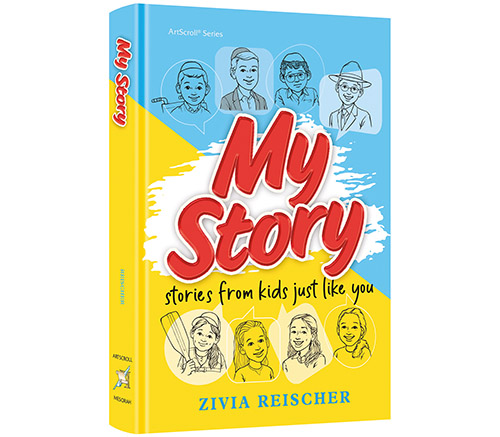
Highlighting: “My Story: Stories From Kids Just Like You” by Zivia Reischer. Mesorah Publications Ltd. 2022. Hardcover. 225 pages. ISBN-13: 978-1422632369.
(Courtesy of Artscroll) Kids—parents, too!—are all raving about “My Story: Stories From Kids Just Like You,” by popular author Zivia Reischer. They’re loving the stories, and they’re loving seeing the unique challenges of young people’s lives through the eyes of kids just like them.
We talked to Zivia Reischer about kids, writing, and the incredible power of stories.
AS: As you are the author of “My Story”—let’s talk about your story. What led you to write for children?
ZR: I don’t think I ever intended to specifically write for kids. I’ve written a lot for adults—mainly in Mishpacha magazine, and I’ve ghostwritten books for adults. I also wrote a few serials for kids in Mishpacha’s Teen Pages and The Circle that morphed into novels. I found that those were the projects that really brought me joy. It didn’t feel like work.
What makes writing for children so uniquely rewarding?
I think it’s because it gives them a voice. They read the story and they’re like, “Yesss! Exactly!” It expresses what they feel but couldn’t express on their own. Sometimes, the story gives them insight into people or experiences—now they understand what’s going on around them. When that happens, that new knowledge becomes part of them. They carry that insight with them for the rest of their lives, and it shapes the way they interact with the world—that’s what we mean when we say they “grow.” It’s very special to be able to be part of that process.
“My Story” has such a varied range of stories, some of them very relatable for children, and others very unusual. Is there any common thread in all the kids’ narratives?
I think they’re all experiences that were very meaningful, maybe we can even say life-altering. In every story, something in the kid’s life changed forever. Some of the stories are very intense, like the one about a kid discovering that his mother has MS. But even those that are less dramatic, like the twin who stops wearing matching clothes to her sister, are built around a moment of real clarity and deep insight that really changed the kid.
You have to remember that kids don’t have a lot of autonomy. Adults have the privilege of making decisions about important things in their lives, but kids mostly get told what to do—go here, go there; we’re switching you to a different school; you can’t buy that; you can’t do that. When you read these stories, it’s incredible to see how kids find the magic spot where they do have a choice about what to think or do or feel, and how strong they can be.
What are some of the issues that the kids touch upon in “My Story”?
The stories fall into two categories: experiences that are universal and experiences that are unique. You know how every class or every family has that one challenging child who gets all the attention and rewards, and the other kids think, I’m doing the right thing, and no one pays any attention to me? And you know how kids always want the new/cool/brand name whatever? And lots of kids—especially girls—know what it feels like to be dropped by a friend. All those scenarios are included in the book, as well as many other common experiences.
But some of the stories are about things that are much less common: There’s a kid who is adopted, a kid who is accused of doing something they didn’t do, a kid who gets stuck in the middle of a river. Some stories are about kids facing a rare, tough choice, or about being stuck in dramatic, unusual situations.
Kids love stories—especially stories about other children their age. Where does the power of a story come from?
When you read a story, your heart is open. You have no vested interest in the outcome. The choices of the characters can’t hurt you, and if everyone in the story fails/flops/dies, no problem, your life will continue as normal. That security lets you read the story without any defenses. Your guard is down. But the magic is that by the time you get to the end, you are literally absorbed in the story—it is no longer a story about distant characters; somewhere in the story you find yourself, and it becomes about you. Whatever the character achieves, you feel like you achieved. And whatever the character learns, gains, or accomplishes, becomes part of you, too.
The power isn’t in the story. The power is in you. The story reveals it.
Which of the stories touched you the most?
This is a pick-your-favorite-child kind of question. Maybe it’s the stories where the kids accomplished something I don’t think I could have done, like the girl who has to choose between her family and her friends. I was also very moved by the kids who are growing up with tough circumstances, like the kid with two homes. But I think the most inspirational stories are about kids who overcame real problems and morphed into a stronger, better version of themselves. Isn’t that what we all really want?









